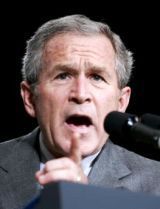Bush to name special envoy for Darfur
Sept 18, 2006 (NEW YORK) — U.S. President George W. Bush, pressured by rights groups and from Congress, has decided to appoint a special envoy to try to end the violence in Sudan’s western Darfur region, a U.S. official said on Monday.
 The official, who asked not to be identified, declined to say who Bush had chosen but Sudan expert John Prendergast of the International Crisis Group said the front-runner was Andrew Natsios, a former Bush administration aid official.
The official, who asked not to be identified, declined to say who Bush had chosen but Sudan expert John Prendergast of the International Crisis Group said the front-runner was Andrew Natsios, a former Bush administration aid official.
Natsios, who resigned last December as head of the U.S. Agency for International Development and is now a professor at Washington’s Georgetown University, did not immediately return phone calls seeking comment.
The U.S. official said Bush would likely announce the appointment of the envoy on Tuesday in New York, where he is attending the U.N. General Assembly.
Darfur is expected to be widely discussed here as the international community tries to persuade Khartoum to drop its objections to a U.N. peacekeeping force in the territory.
Aid and rights groups have complained that the Bush administration’s interest in Darfur had waned after the departure earlier this year of former Deputy Secretary of State Robert Zoellick, who had focused on the issue.
Earlier this month Richard Lugar, chairman of the U.S. Senate Foreign Relations Committee, introduced legislation calling on Bush to name a special envoy and last week senators of both parties wrote to Bush urging him to take “decisive action” to address the disaster.
“ETHNIC CLEANSING”
“The Sudanese government appears to be making an all-out push to finish the job of ethnic cleansing in Darfur,” they wrote. “Mr President, tens of thousands of lives may hang in the balance.”
On Sunday thousands of people attended rallies around the world demanding international intervention to bring peace.
In three years of fighting in Darfur an estimated 200,000 people have been killed and millions forced from their homes.
Natsios, who focused much of his time as USAID chief on the crisis in Sudan, visited Darfur in 2004 with then U.S. Secretary of State Colin Powell, who later labeled what was happening as genocide. Khartoum strongly disagrees.
Zoellick personally intervened to broker a peace deal earlier this year between Sudan’s government and the main rebel group but the violence has intensified since then and the deal essentially has broken down.
The United Nations passed a resolution last month to send 20,000 peacekeepers to Darfur where about 7,000 African Union troops have been battling to keep the peace in an area the size of France. Sudan has so far refused to accept a U.N. force.
Prendergast said any special envoy would have to focus on trying to reach a political solution with the warring parties in Darfur, rather than just on getting a U.N. force into the region.
(Reuters)
